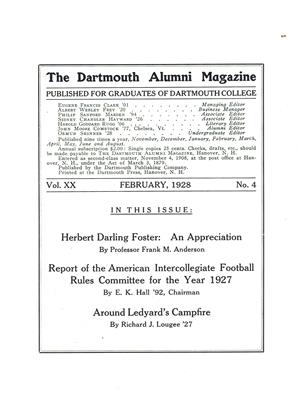Green Places Fourth at Lake Placid Meet
Wisconsin, scoring 23 points, won first place in the informal winter sports competition held at Lake Placid during the annual College Week in the last week in December, followed by McGill and New Hampshire, in a tie for second place at 16 points, and Dartmouth, with 12 points. Other colleges scoring were: Syracuse 11; Ottawa 8; Vermont 1; Middlebury 1. Bates, Williams and R. P. I. failed to score.
Captain C. N. Proctor '28 scored nine of Dartmouth's points, taking first place in the one mile down hill ski race and third in both the seven mile cross-country and the jumping events. D. B. Cruikshank '31 placed third in the figure skating event and T. T. Brittan '29 took fourth in the seven mile cross-country race.
The Harding Trophy was not awarded this year due to the fact that three days of warm and rainy weather made it impossible to run off all of the scheduled events. O. E. Pederson of New Hampshire University won the Marshal Foch Ski Jumping Trophy.
Winter Sports Captain on Olympic Team
Charles N. Proctor '28, captain of the Dartmouth winter sports team, will be one of the three men to represent the United States in the ski championship contest of the 1928 Olympic games. He has been notified through the Eastern United States Amateur Ski Association that the Olympic Committee has selected him to engage in the combined ski jumping and cross-country competition to be held at St. Moritz this winter.
Proctor held the captaincy of the ski team last year, and was reelected for the coming season. He made the present ski jump record of 130 feet for the D. O. C. jumping hill in 1926, and last year won the all-around ski championship of Canada, which includes jumping and cross-country.
Proctor will not return immediately after the competition is over, since he intends to visit Norway and to enter the Holmenkollen meet there. This meet is the greatest and oldest of its kind in the world.
Proctor is the second Dartmouth man to achieve Olympic honors in winter sports, and the first to do so before graduating, as his predecessor, J. Carleton '22, competed when a Rhodes scholar at Oxford.
On the team with Proctor will be Ralph Monson, of Springfield, Mass., one of the greatest skiers in the East, and Anders Haugen of Chicago. Proctor and his fellow-skiers sailed from New York January 21.
Lacrosse Team Joins Eastern League
The Athletic Council has announced that the Lacrosse team has joined the Intercollegiate Lacrosse Association.
An invitation to membership was extended to Dartmouth last year but was not then accepted as it was thought that the team was not of sufficient strength to compete with the strong teams of the league. This membership does not entail direct competition between members but furnishes a means of scheduling the best games possible through the contact with other large colleges which are members.
Because of no direct contests between members, no regular championship is awarded, but a mythical championship of the association is judged by the referees. This championship is based on ratings of the teams and on the placing of the referees.
The schedule for Lacrosse which has been arranged for this yiear was made possible through the association. It includes some of the strongest teams in the east such as Harvard, Yale, Penn, Syracuse, Boston Athletic Club, and Brown. Princeton is the only large college in the East which has a lacrosse team which is not now a member of the Association.
Dartmouth-Cornell at Oxford
The following sports comment "The English System" taken from The New York Times gives a side-light on the activities of two prominent Rhodes Scholars at Oxford:
Over in England they don't bother about rules as much as we do here. Take Rugby, for instance. George Pfann, former Cornell football star, and Nate Parker, former Dartmouth gridiron leader, were sent to Oxford as Rhodes Scholars and were playing Rugby with their English cousins. They were on the same team, whatever particular College of Oxford it may have been. Perhaps Balliol (pronounced Sin-jen), or Magdalen (pronounced Sin-jen) or Exeter (pronounced Sin-jen).
It doesn't matter. In any case, Pfann sprang a long spiral pass to Parker before the eyes of the astonished Oxonians, and Parker dashed away to a touchdown. It was revolutionary. It was quite within the rules, but it would wreck the jolly old game of Rugby if the practice were encouraged or adopted. The English lads knew nothing of the art of tossing long spirals, and they didn't propose to learn it. Life was too short. They liked their own way of playing the game, and they were determined to keep it.
Did they frame a rule to bar the long spiral pass ? No, indeed. The players settled the matter themselves. And immediately.
Mr. Cholmondeley (pronounced Bee-cham) said to Mr. Crichton (pronounced Gren-ich) :
"I say, that won't do. It will spoil the game no end. What ?"
Mr. Beauchamp (pronounced Chum-ley) chimed in: "Quite so. Let's ask them not to use it any more."
Getting the spirit of the idea, Mr. Pfann (pronounced Pfann) and Mr. Parker (pronounced Parker) agreed not to use it any more. And thus the matter ended.
Perhaps football can be saved in the same way.
 View Full Issue
View Full Issue
More From This Issue
-
 Sports
SportsREPORT OF THE AMERICAN INTERCOLLEGIATE FOOTBALL RULES COMMITTEE FOR THE YEAR 1927
February 1928 By E. K. Hall '92 -
 Lettter from the Editor
Lettter from the EditorEditorial Comment
February 1928 -
 Article
ArticleHERBERT DARLING FOSTER An Appreciation
February 1928 By Frank M. Anderson -
 Class Notes
Class NotesClass of 1918
February 1928 By Frederick W. Cassebeer -
 Class Notes
Class NotesClass of 1921
February 1928 By Herrick Brown -
 Article
ArticleCOLLEGE NEWS
February 1928








